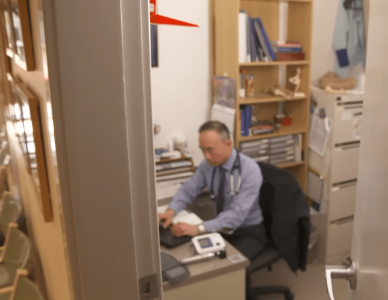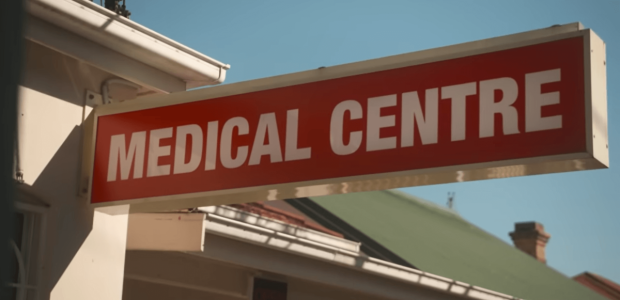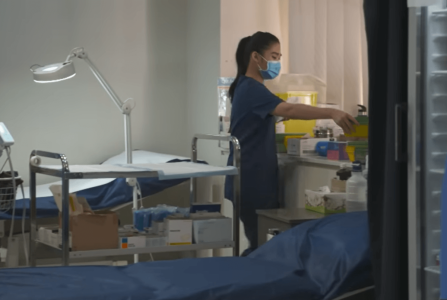‘Medicare no longer works’: Report pushes for a healthcare system overhaul
- Replies 10
It's no secret that Australia's healthcare system isn't perfect.
We've all heard horror stories from people who have had trouble getting the care and treatment they need in a timely fashion.
In addition, the country has an uneven distribution of healthcare professionals with 437 doctors for every 100,000 Aussies in urban centres to just 264 for the same number of people in remote areas.
Now, a new report from the Grattan Institute has found that Medicare is in dire need of an overhaul.
According to a new report titled A new Medicare: Strengthening General Practice, ‘Medicare no longer works for patients or GPs (General Practitioners).’
‘The way GPs work and get paid should be overhauled so Australia can turn the tide of chronic disease, keep more people out of hospital, and ensure poorer Australians get the care they need when they need it.’
The report says Medicare has failed to keep up with the changes in Australians’ health needs since it was established in 1984.

While the work of GPs has become more complex with an ageing population and increases in mental health diagnosis and chronic disease, the average appointment still goes for just 15 minutes – which hasn't changed in at least 20 years.
This means that GPs are often struggling to meet their patients needs, and may end up providing substandard care as a result.
‘Other countries have reformed general practice, and their rates of avoidable hospital visits for chronic disease are falling. But Australia is spending more on hospitals while neglecting general practice: the best place to tackle chronic disease.’ the report pointed out.
It is estimated that the Australian Government has spent $98.3 billion in the last fiscal year on health-related expenditures, including assistance for public hospitals and hospital services.
The lack of focus on improving GP services is harming patients, according to the report.
‘Patients suffer the consequences. People with chronic disease live shorter lives, with more years of ill health, and lower earnings. Poorer Australians suffer the most: they are twice as likely to have multiple chronic diseases as wealthy Australians.’ the report underscored.
The same setup is also hard for health workers too.
The report added: ‘Australia’s healthcare workers are also struggling. Hospital staff are overwhelmed with demand. And GPs tell us they are stressed, disrespected, and disillusioned.’
The COVID pandemic has introduced massive stress to healthcare workers across the country and prompted discussions on creating a better environment for providers suffering from occupational burnout.
According to Dr Tammra Warby of the Royal Australian College of General Practitioners (RAGCP), 58 per cent of doctors in a 2021 poll said managing fatigue and burnout was one of their most pressing concerns.

To address the glaring shortcomings of Medicare, the report proposed several steps.
First, it proposed making general practice more of a ‘team sport’, with many allied health professionals operating under a GP to provide better service to Aussies.
‘To achieve this, the federal government will have to dismantle the regulatory and funding barriers that force GPs to go it alone.’
‘To accelerate the change, 1000 more clinicians, such as nurses and physiotherapists, should be employed in general practices in the communities that need them most.’
The next change tackles how GPs earn their living.
‘Australia needs to change the way GPs are paid. The current method is broken — it actively discourages GPs from working with teams, and it rewards GPs who see lots of patients in quick succession, rather than spending more time with patients who need more care.’ it said.
‘GPs should be able to choose a new funding model that supports team care and enables them to spend more time on complex cases, by combining appointment fees with a flexible budget for each patient based on their level of need.’
GPs in Australia earn a percentage of their billings currently, according to Transition Medical. This means that they don’t get paid fixed salaries. Rather, how much they earn is determined by factors like how many patients they’re able to see and what type of cases they’re working on.
And lastly, the report says the government has to do more in terms of giving clinics and health centres additional funding, data, and other forms of support for patients to access the best quality of care possible.
The government has set aside $750 million in the 2023 National Budget specifically for the introduction of improvements to Medicare, including enhancing digital health capabilities for GPs.

An additional $235 million was also allotted for the next four years to roll out more urgent care clinics across Australia to provide more healthcare access points.
Given the funding set aside for health, the report stresses there is money available for their recommendations given the sad state of Medicare.
‘Medicare is in the grip of a mid-life crisis. The reforms we propose will give more patients better care, and boost GPs’ job satisfaction.’
‘And our reform plan is affordable. The Albanese Government has set aside $250 million a year to fix Medicare.
‘That money can fund the recommendations in this report, repairing the foundation of Australia’s healthcare system and creating a new Medicare that is ready for the decades ahead.’
The government for its part has taken note of the report.
‘Every household in the country … has seen it harder and harder to get access to bulk billing,’ Assistant Treasurer Stephen Jones said in response.
‘Difficulty in getting access to GPs in particular, and the big gap between what they’re being charged and what they’re getting back from Medicare.
‘There is an issue. There’s no doubt about it.’
If you have time, you may want to read a similar appeal from the RAGCP and allied groups calling for reforms to the ‘outdated’ Medicare system.
What do you think of Grattan Institute’s findings? Do you agree that the proposed reforms are what is needed for Medicare to improve? What has your experience been?
Tell us your thoughts and opinions below!
Source: YouTube/ABC News Australia
We've all heard horror stories from people who have had trouble getting the care and treatment they need in a timely fashion.
In addition, the country has an uneven distribution of healthcare professionals with 437 doctors for every 100,000 Aussies in urban centres to just 264 for the same number of people in remote areas.
Now, a new report from the Grattan Institute has found that Medicare is in dire need of an overhaul.
According to a new report titled A new Medicare: Strengthening General Practice, ‘Medicare no longer works for patients or GPs (General Practitioners).’
‘The way GPs work and get paid should be overhauled so Australia can turn the tide of chronic disease, keep more people out of hospital, and ensure poorer Australians get the care they need when they need it.’
The report says Medicare has failed to keep up with the changes in Australians’ health needs since it was established in 1984.

A new Grattan Institute report details points for improvement in Australia’s Medicare program for GPs and patients. Screengrab Credit: YouTube/ABC News Australia
While the work of GPs has become more complex with an ageing population and increases in mental health diagnosis and chronic disease, the average appointment still goes for just 15 minutes – which hasn't changed in at least 20 years.
This means that GPs are often struggling to meet their patients needs, and may end up providing substandard care as a result.
‘Other countries have reformed general practice, and their rates of avoidable hospital visits for chronic disease are falling. But Australia is spending more on hospitals while neglecting general practice: the best place to tackle chronic disease.’ the report pointed out.
It is estimated that the Australian Government has spent $98.3 billion in the last fiscal year on health-related expenditures, including assistance for public hospitals and hospital services.
The lack of focus on improving GP services is harming patients, according to the report.
‘Patients suffer the consequences. People with chronic disease live shorter lives, with more years of ill health, and lower earnings. Poorer Australians suffer the most: they are twice as likely to have multiple chronic diseases as wealthy Australians.’ the report underscored.
The same setup is also hard for health workers too.
The report added: ‘Australia’s healthcare workers are also struggling. Hospital staff are overwhelmed with demand. And GPs tell us they are stressed, disrespected, and disillusioned.’
The COVID pandemic has introduced massive stress to healthcare workers across the country and prompted discussions on creating a better environment for providers suffering from occupational burnout.
According to Dr Tammra Warby of the Royal Australian College of General Practitioners (RAGCP), 58 per cent of doctors in a 2021 poll said managing fatigue and burnout was one of their most pressing concerns.

The report says the government is spending funding on health sector improvements without looking at how general practice across the country can be better. Screengrab Credit: YouTube/ABC News Australia
To address the glaring shortcomings of Medicare, the report proposed several steps.
First, it proposed making general practice more of a ‘team sport’, with many allied health professionals operating under a GP to provide better service to Aussies.
‘To achieve this, the federal government will have to dismantle the regulatory and funding barriers that force GPs to go it alone.’
‘To accelerate the change, 1000 more clinicians, such as nurses and physiotherapists, should be employed in general practices in the communities that need them most.’
The next change tackles how GPs earn their living.
‘Australia needs to change the way GPs are paid. The current method is broken — it actively discourages GPs from working with teams, and it rewards GPs who see lots of patients in quick succession, rather than spending more time with patients who need more care.’ it said.
‘GPs should be able to choose a new funding model that supports team care and enables them to spend more time on complex cases, by combining appointment fees with a flexible budget for each patient based on their level of need.’
GPs in Australia earn a percentage of their billings currently, according to Transition Medical. This means that they don’t get paid fixed salaries. Rather, how much they earn is determined by factors like how many patients they’re able to see and what type of cases they’re working on.
And lastly, the report says the government has to do more in terms of giving clinics and health centres additional funding, data, and other forms of support for patients to access the best quality of care possible.
The government has set aside $750 million in the 2023 National Budget specifically for the introduction of improvements to Medicare, including enhancing digital health capabilities for GPs.

The report proposes augmenting GP practices with more allied health professionals for better patient service. Screengrab Credit: YouTube/ABC News Australia
An additional $235 million was also allotted for the next four years to roll out more urgent care clinics across Australia to provide more healthcare access points.
Given the funding set aside for health, the report stresses there is money available for their recommendations given the sad state of Medicare.
‘Medicare is in the grip of a mid-life crisis. The reforms we propose will give more patients better care, and boost GPs’ job satisfaction.’
‘And our reform plan is affordable. The Albanese Government has set aside $250 million a year to fix Medicare.
‘That money can fund the recommendations in this report, repairing the foundation of Australia’s healthcare system and creating a new Medicare that is ready for the decades ahead.’
The government for its part has taken note of the report.
‘Every household in the country … has seen it harder and harder to get access to bulk billing,’ Assistant Treasurer Stephen Jones said in response.
‘Difficulty in getting access to GPs in particular, and the big gap between what they’re being charged and what they’re getting back from Medicare.
‘There is an issue. There’s no doubt about it.’
If you have time, you may want to read a similar appeal from the RAGCP and allied groups calling for reforms to the ‘outdated’ Medicare system.
What do you think of Grattan Institute’s findings? Do you agree that the proposed reforms are what is needed for Medicare to improve? What has your experience been?
Tell us your thoughts and opinions below!
Source: YouTube/ABC News Australia







